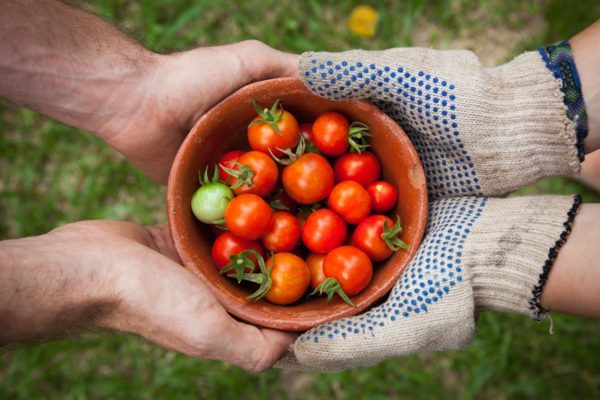This article is part of a bi-monthly series focusing on bringing truly sustainable business practices to the restaurant industry. This series has been created in partnership with Thrive Farmers International, a leader in revolutionizing the coffee industry and teaching others to do things differently.
Transforming Supply Chains
Cultivating Farmer Relationships for Sustainable Impact
What if you saw your supply chain as a series of relationships rather than a system of getting products to your customers? Would you consider those relationships successful, healthy, and thriving? Do you know who is sitting at the farmer’s table? Does the farmer know you, your company, and your mission?
When you talk with coffee farmers about their business in Central America, the conversation always turns to money.
It’s noble to talk about using better agricultural practices, treating workers fairly, reforestation, and investing in future business opportunities for a farm. However, if you are a coffee farmer coming in for lunch, the first thing you see at your kitchen table is the people you love sharing a cup of coffee, waiting to enjoy a meal with you. If you can’t support them with the income of the family farm, then you probably need to find something else to do to ensure that the kitchen table has food, and the people around it are provided for, first and foremost.
After sitting around countless coffee farmers’ kitchen tables, Thrive Farmers has learned that the key to helping them is to make sure they are the most important part of the supply chain. Farmers tell us that unless businesses help them solve the economic hurdles they struggle with, other desired changes in their communities or the environment are neither feasible nor obtainable.
To understand a solution we must understand the need. The greatest enemy of a coffee farmer, even more than global warming, fungus, or drought, is the volatile commodities market in which he or she doesn’t know what the price of a crop—and ultimately income—will be from one day to the next. Pair that with an ever-increasing cost of production and all the other normal risks a farmer faces, and you have a valid excuse for farmers and more importantly, their children to leave coffee farming in search of an easier and more stable means to put food on the kitchen table.
We’ve all watched coffee prices tick upward in restaurants in recent years. It’s clear that consumers want great coffee, and they are willing to pay for it. The demand is growing year over year, even resisting economic downturns in the marketplace. If nothing changes, supply will not be able to meet the rising demand.
So, how do Thrive Farmers and your company offer farmers something different?
In its most simple explanation, Thrive Farmers shares the revenue generated from consumers with farmers. This price is consistent, predictable, and higher than that which global coffee traders set on any given day in the New York commodities market. The result is more income to the farmer. This means the farmer can overcome the economic hurdles of coffee farming and move from surviving to investing in their family and business. Being intentional about how much money farmers make is key to a stable supply chain—and the future of coffee as a whole.
Companies can have a lasting impact on farming communities around the world by purposefully choosing to purchase basic items with intention (like coffee and tea), and by looking at their supply chain as a chain of relationships. Once farmer partners in your supply chain can wake up without the concern of an unpredictable income, they can begin to think proactively about all aspects of their work, including a better life for their family and community, and from the restaurant’s perspective, more investments in the farm for a better quality product for your customers.
Through our kitchen table conversations with coffee farmers, we have also learned an incredibly simple but powerful concept that most busy folks in the day-to-day of running a restaurant supply chain blow right past when considering the products they serve daily. When embraced, this concept can raise the quality of the product and create more economic value and positive emotional impact for everyone involved.
Here it is—farmers want to know who uses their products, and customers want to know who grows what they eat and drink.
Human beings want to be connected. They want to know that what they do and how they live matters. Is this a real consideration every day in supply chain management?
Connecting the farmer to the restaurant not only overcomes economic hurdles, but it provides an essential supply chain ingredient for a successful product and a happy customer: a real relationship with the farmer. This allows customers and team members to know who grows their coffee and tea, and that knowledge empowers them to use a bit of their daily lives to create a positive impact in the lives of others around the world.
If you want your company and your supply chain to have an impact on the world, think about small concrete steps that can make a difference. Do you see the folks who grow your products as partners? Do you have a relationship with them? Are you sure that the business you’re engaging in with your suppliers is building a positive relationship or are your partners just surviving? Do the daily practices and supply chain decisions of your business result in changing the lives of those around the farmers’ kitchen table each morning?
Let’s change the economics and build relationships in our supply chains so farmers wake up every day with the incentive to grow that next cup of coffee or tea for our customers.
Kenneth Lander is the co-founder and chief sustainability officer at Thrive Farmers International. Thrive Farmers was founded in 2011 to transform the coffee industry by connecting farmers to consumers through a new supply chain. To learn more about Thrive, visit their website or follow them on Twitter at @ThriveFarmers.
